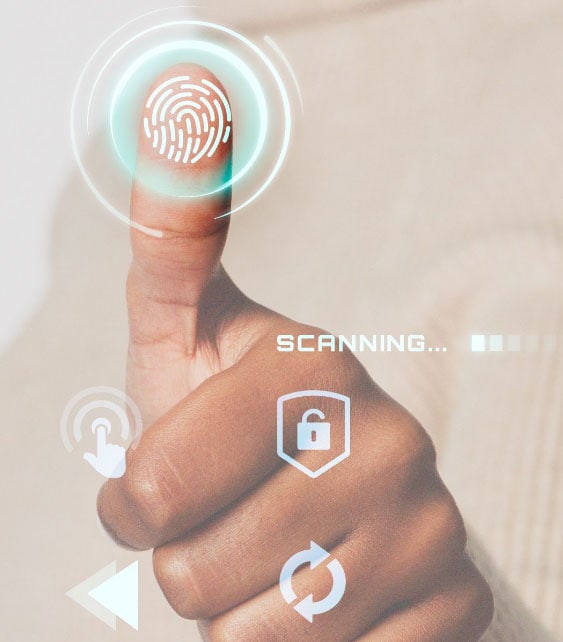
Biometrics utilizes measurable biological and behavioral traits like fingerprints, facial recognition, and iris scans for identification and access control. This technology analyzes these unique characteristics to verify a person's claimed identity. Increasingly prevalent in today's digital age, biometric systems offer enhanced security and convenience due to their ability to provide unique, hard-to-duplicate identifiers, thus reducing fraud and streamlining authentication processes.
However, while biometrics offer strong security, they have potential drawbacks. For one, unlike passwords, compromised biometric data (fingerprints, iris scans) cannot be changed. Additionally, high implementation costs can be prohibitive, especially for smaller organizations. Lastly, false positives and negatives can lead to security breaches or inconvenience. Hence, it is important for organizations to weigh these pros and cons carefully.
Types of Biometrics Security
Several types of biometric security systems are employed today, each with its own strengths and weaknesses.
- Fingerprint Recognition: Utilizes the unique patterns of ridges and valleys on an individual's fingertips to authenticate identity. Commonly used in smartphones and access control systems due to its high accuracy and ease of use.
- Facial Recognition: Analyzes facial features such as the distance between eyes, nose shape, and jawline to verify identity. Widely used for security surveillance and device unlocks, offering a non-intrusive method of authentication.
- Iris Recognition: Scans the unique patterns in the colored ring around the pupil of the eye. Known for its high accuracy and security, it's often used in high-security environments like airports and government facilities.
- Voice Recognition: Identifies individuals based on their vocal characteristics, such as pitch, tone, and speech patterns. Useful for remote authentication over phone calls or virtual assistants, providing convenience and accessibility.
- Palm Vein Recognition: Uses near-infrared light to capture the unique vein patterns inside the palm. Highly secure and difficult to forge, this method is employed in banking and healthcare institutions.
- Behavioral Biometrics: Monitors patterns in user behavior, such as keystroke dynamics, mouse movements, and touchscreen interactions. Enhances security by continuously verifying identity-based on behavior, commonly used for fraud detection.
For more information on biometric solutions, visit Suprema Biometric Solutions.
Pros (Advantages) of Biometrics
Biometric solutions offer a myriad of advantages that enhance security and user convenience.
- Quicker Authentication: Biometric authentication speeds up identity verification, offering near-instant access compared to traditional methods like passwords or PINs.
- Enhanced Security System: Biometrics provide superior security by using unique physiological traits, reducing the risk of unauthorized access and data breaches.
- Unmatched Convenience: Users benefit from the ease of not having to remember passwords or carry tokens, as biometrics enable authentication through simple actions like fingerprint scans.
- Precise Access Control: Biometrics offers precise, individualized access control, ensuring only authorized individuals can access sensitive areas or information.
- Easily Scalable Solutions: Biometric systems can scale from personal devices to large organizations, making them versatile for various applications and industries.
- Adaptive Flexibility: Biometrics can be easily integrated into existing systems or customized for new setups, fitting various use cases and environments.
- Superior Return on Investment (ROI): Despite high initial costs, biometrics reduce fraud and operational expenses, leading to a better long-term ROI.
- Guaranteed Data Accuracy: Biometric systems offer highly accurate identification and verification, ensuring reliable and trustworthy access control.
Cons (Disadvantages) of Biometrics
While biometric solutions offer numerous advantages, it is essential to consider their potential drawbacks as well.
- Physical Disabilities: Not all individuals can provide biometric data due to physical disabilities or conditions that affect traits like fingerprints or retinal patterns, potentially excluding them from using biometric systems.
- High Initial and Ongoing Costs: Implementing and maintaining biometric systems can be expensive, with significant investment required for hardware, software, and regular updates.
- Irreversible Nature of Biometric Data: Once compromised, biometric data cannot be changed like passwords. If an individual's biometric data is stolen, it poses a lifelong security risk.
- Scanner Issues: External factors such as dirt, smudges, or lighting conditions can affect biometric scanners, leading to inaccurate or failed scans.
- Software Malfunction: Like all technology, biometric systems can suffer from glitches or failures, disrupt authentication processes, and require costly technical support.
- Limitations in Remote Accessibility: Remote biometrics authentication can be challenging, especially when dedicated biometric hardware is unavailable, reducing their applicability in remote or mobile scenarios.
- Security Breaches: While generally secure, biometric systems are not invulnerable; sophisticated attacks can still bypass them, and breaches can have severe implications due to the irreversible nature of biometric data.
- Fake Positives: False positives, where unauthorized users are mistakenly granted access, can undermine the reliability of biometric systems and pose significant security risks.
Summary
Biometric systems offer significant advantages like quicker authentication, enhanced security, and unmatched convenience. However, they may also come with challenges such as high costs and potential accessibility issues for those with physical disabilities.
If you're seeking a reliable biometric supplier in the Philippines, trust Hitec International. Feel free to call us at (632) 8724-0191 or email us at info@hitec.com.ph for inquiries and more information. Our expert team will gladly assist you with your biometric needs.


